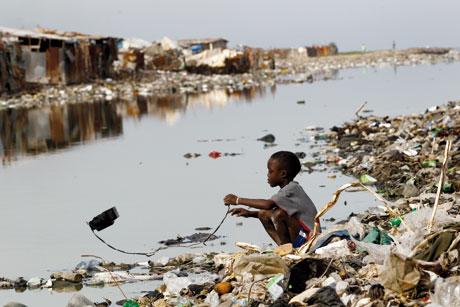Published online 18 October 2011 | Nature | doi:10.1038/478295a
News
No quick fix for Haiti cholera
As outbreak enters its second year, relief bodies move to roll out vaccine for the first time.
 Until clean water and sanitation are readily available in Haiti, cholera outbreaks will continue.J. Silva/Reuters
Until clean water and sanitation are readily available in Haiti, cholera outbreaks will continue.J. Silva/Reuters
A year after cholera broke out in the aftermath of the January 2010 Haiti earthquake, the epidemic has disappeared from the headlines, but it continues to wreak a deadly toll. Mortality rates remain high in some areas, but donor funding for front-line response teams is drying up, even as a newly approved vaccine offers a glimmer of hope.
The epidemic has already caused almost half a million cases, half of which have required hospitalization. Haiti's health ministry says that roughly 6,500 people have died from their infections — a figure widely believed to be an underestimate.
The Pan American Health Organization (PAHO) in Washington DC expects the epidemic to ease partially, but nonetheless predicts a further 250,000 cases next year, says Peter Graaff, the PAHO/World Health Organization (WHO) representative in Haiti.
Shanchol, a vaccine approved by the WHO for worldwide use on 29 September, could brighten the outlook. It was developed by the International Vaccine Institute in Seoul with support from the Bill & Melinda Gates Foundation, and is produced by Shantha Biotechnics in Hyderabad, India, a subsidiary of vaccine company Sanofi Pasteur. Two groups of non-governmental organizations (NGOs) operating in Haiti now intend to include the vaccine in their own emergency responses to cholera.
At US$1.85 a dose, Shanchol is cheaper than the only other currently available cholera vaccine — Dukoral, made by Crucell, based in Leiden, the Netherlands. Shanchol is also given orally, and requires fewer doses in children under six, who are among the most vulnerable to cholera. The vaccine's benefits "are really clear for the outbreak contexts in which MSF works", says Julia Hill, vaccines policy adviser at Médecins Sans Frontières (MSF), also called Doctors Without Borders, in Geneva, Switzerland.
MSF has one of the largest ongoing emergency-response operations in Haiti, treating as many as one-third of all reported cholera cases. It intends to begin vaccinating with Shanchol soon in Haiti; it is also considering a vaccination campaign in West and Central Africa, where cholera is currently resurging. MSF has yet to finalize details of its campaign, but will probably focus vaccination efforts on vulnerable groups, such as people in remote rural areas, who lack timely access to treatments.
Because mountainous communities can often be reached only after half-a-day's journey on foot, "a whole village can be infected before help arrives", says Michel Van Herp, an epidemiologist in the MSF office in Brussels. Van Herp oversaw MSF's field response at the start of the epidemic, when as many as 9% of cases resulted in fatalities. In the capital, Port-au-Prince, that figure has now been brought down below 1%, but in remote rural areas, death rates as high as 5–10% persist, he says.
A separate campaign aims to vaccinate 100,000 vulnerable Haitians using 200,000 doses of Shanchol. That effort will be carried out jointly by GHESKIO, an NGO based in Port-au-Prince, and Partners in Health (PIH), a non-profit organization in Boston, Massachusetts, that is affiliated with health groups at Harvard University in Cambridge, Massachusetts. The group intends to launch its campaign in January 2012, says Louise Ivers, a senior adviser to PIH working in Haiti. The lack of clean water and sanitation in Haiti, and the poor prospects for improving that infrastructure in the near future, makes for a "compelling argument" to use cholera vaccines, she says.
The WHO opposed vaccination during the chaos of the initial cholera outbreak in Haiti; Claire-Lise Chaignat, coordinator of the WHO's Global Task Force on Cholera Control, argued at the time that the logistics would have been impossible to manage (see Nature 468,483–484; 2010). But the chaos has subsided, and the peaks in numbers of cholera cases are coming less frequently, so the WHO now supports targeted vaccination in Haiti, says Chaignat.
Eventually, the Haitian government will have to assume responsibility and run its own vaccination programmes, but persuading them to do so could be tough, warns Van Herp — not least because there is little economic or political interest in the rural target communities that might benefit most. Van Herp and other experts also warn that cholera vaccination is no panacea. The focus of relief efforts must be on rehydrating the dangerously ill with a cheap and highly effective oral solution of glucose and salts, he says. Building infrastructure to provide clean water and sanitation is the only way to prevent cholera in the long term.
But a reduction in
